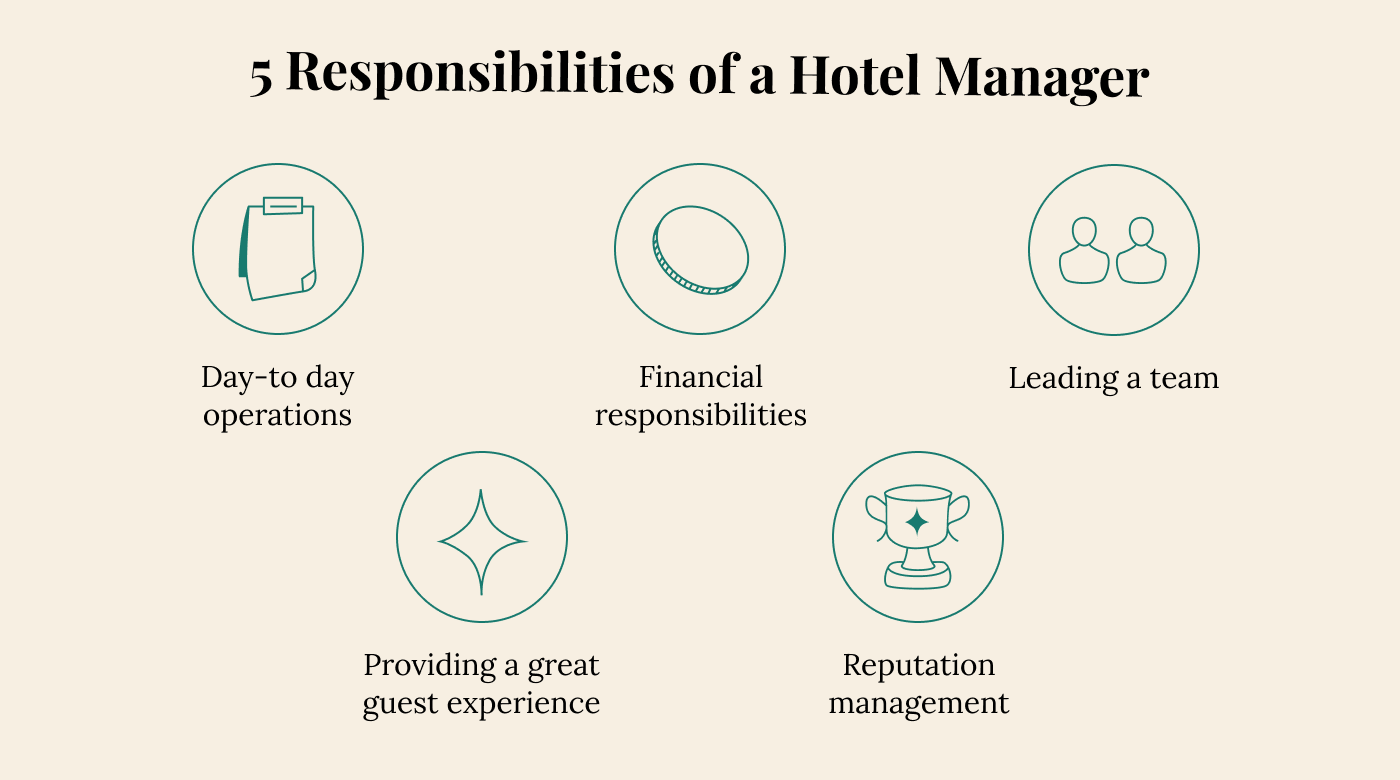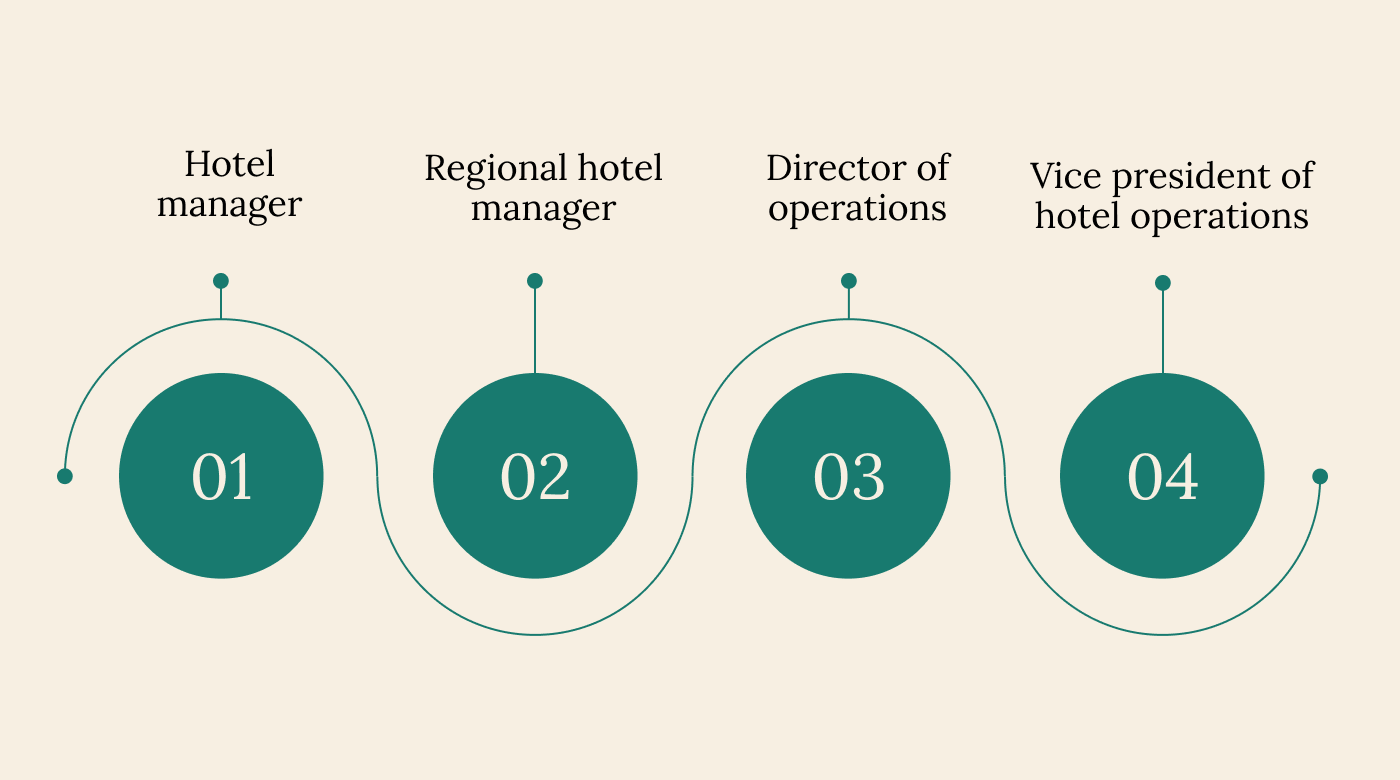If you’re here because you want the inside scoop on hotel manager salaries, you’re in luck!
In this article, I’ll cover everything related to a hotel manager’s salary, from the factors that influence the amount on their paycheck, how the pay compares to different industries and other hospitality management positions, and the benefits and perks beyond the base salary.
Let’s dive in!
What Does a Hotel Manager Do?
With the Bureau of Labor Statistics forecasting 18% growth for hotel manager jobs in the U.S. by 2031, it’s important to understand their role in the hospitality industry.
So what exactly do hotel managers do to keep businesses humming?

A day in the life of a hotel manager involves ensuring all tasks and activities related to hotel operations and guest experiences are running smoothly. Here are some tasks and responsibilities that fall under the purview of a typical Hotel Manager:
- Overseeing daily hotel operations: Ensure all hotel positions and departments run smoothly and efficiently throughout the day.
- Managing hotel staff schedules: Organize staff shifts and make sure there’s enough coverage for all hotel areas, also hiring new hotel staff.
- Ensuring guest satisfaction: Make sure guests have a positive experience from check-in to check-out.
- Handling guest complaints: Address and resolve any issues guests might have during their stay.
- Supervising housekeeping and maintenance teams: Monitor cleaning and maintenance tasks to keep the hotel in top shape.
- Managing the hotel budget: Plan and track expenses to make sure the hotel stays profitable.
- Tracking expenses and revenues: Keep a close eye on money coming in and going out to maintain financial health.
- Coordinating with suppliers and vendors: Work with external partners to ensure timely delivery of goods and services.
- Overseeing front desk operations: Ensure check-in, check-out, and guest inquiries are handled efficiently.
- Monitoring room bookings and availability: Track reservations to optimize occupancy rates and availability.
- Ensuring the hotel complies with safety standards: Make sure the hotel follows local regulations and safety protocols.
- Conducting staff training sessions: Teach employees the skills they need to do their jobs well.
- Managing hotel marketing and promotions: Plan and execute marketing strategies to attract more guests.
- Ensuring cleanliness in all hotel areas: Check that all areas of the hotel meet cleanliness standards.
- Handling payroll for hotel employees: Process staff payments accurately and on time.
- Organizing events or conferences at the hotel: Plan and manage events hosted at the hotel to ensure smooth execution.
- Reviewing guest feedback and making improvements: Analyze reviews and take action to enhance guest experience.
- Maintaining inventory of hotel supplies: Keep track of hotel supplies and reorder as needed to prevent shortages.
- Setting hotel policies and procedures: Develop rules and guidelines to maintain order and consistency.
- Handling any emergency situations or issues: Respond quickly to unexpected problems like accidents or power outages.
Much of this can be organized to some degree using hotel management software, so hotel manager hopefuls should become familiar with the top platforms in the industry.
How Much Do Hotel Managers Make?
As of 2024, Indeed.com states that the average salary for a Hotel Manager is $64,279 per year in United States. According to Talent.com, the average hotel management salary in the USA is $78,000 per year or $37.50 per hour. So you can assume hotel managers make, on average, somewhere between $64,279 - $78,000 per year.
Let's break that down a bit more:
Starting salary of an entry-level hotel manager
But what if you’re newly entering the industry? Everyone needs to start somewhere with their first hotel management resume.
For a hospitality management graduate with less than a year of experience, you’re typically looking at an annual salary of $38,135 for a hotel manager position.
Alternatively, you might begin as an assistant hotel manager—a position with an average salary of $46,275. As an assistant hotel manager, you may work your way up to a higher salary as you gain experience and take on more responsibilities.
Highest salary for a Hotel Manager
The highest salary for a Hotel Manager can go up to around $141,153+ a year. While the average pay is $67,219 annually, there’s quite a bit of range, with top earners in the 90th percentile making about $99,130 each year. This wide range shows there’s potential to earn more depending on your experience, skills, and location within the area.
Consider also what specific hotel management job title you are targeting. Here, ZipRecruiter gives some hearty examples of higher earning hotpitality management jobs in L.A.:

To make more money, look for job titles with "Director" or "Senior" in the title, though you will need ample experience in the industry before you are considered for a top hotel management role.
5 Factors That Affect a Hotel Manager’s Salary
Several factors affect a hotel manager’s salary. Understanding them will help you gauge these professionals’ earning potential and how they can optimize their compensation.
Experience
As in most industries, the more experience you have, the more you get paid—and rightfully so. Hotel managers who have spent years honing their skills and navigating the industry will have higher salaries due to their accumulated knowledge and expertise.
Their understanding of the industry’s nuances is only gained through firsthand experience and is, therefore, very valuable for employers. Hotel managers who have a track record of success can demand a higher salary, as they bring a proven ability to drive profitability.
So, to maximize your earning potential, gaining more hotel management experience is the way to go. Consider seeking opportunities for growth within your current hotel or exploring roles in higher-end establishments.
You can show off your experience by nailing the answers to common hotel management interview questions. Don't forget to focus on quantitative proof:
- ...increased revenue by 30% in 2023...
- ...doubled online booking with XYZ marketing campaign...
- ...reached 1M website visits with ABC ad campaign...
Education
While real-world experience is important in the hotel industry, having a bachelor’s or master’s degree in hospitality management or related fields translates to a strong foundation of knowledge and skills.
Obtaining certifications like Certified Hotel Administrator (CHA) or Certified Hospitality Supervisor (CHS) shows that hotel managers are good at what they do. This makes them more marketable. There are plenty of hotel management courses you can pick from.
Managers with advanced degrees and certifications are seen as more qualified and capable, which makes them attractive candidates for higher-paying jobs. Investing time in education and earning certifications positions you for a higher salary and more hospitality management career advancement opportunities.
Hotel size and class
Think about the difference between managing a luxury hotel and a budget chain.
A hotel’s size and class directly influence its pricing—and, consequently, the manager’s earning potential.
Larger hotel chains can offer higher salaries because they make a lot more revenue per room than budget hotels do. Yet, with a bigger paycheck can also come a longer list of demands and responsibilities. This might mean dealing with more finicky customers, working longer hours, or providing a higher level of service.
A small boutique hotel, on the other hand, is a smaller and simpler environment. With fewer responsibilities a small boutique hotel manager.would likely earn a lower salary than they could with a national or international hotel brand.
Location
Location is the golden ticket for hotels and hotel managers. Guests are willing to pay a premium to stay in the center of New York City rather than the suburbs of New Jersey. This means location directly impacts the hotel’s revenue—and, in turn, the hotel manager’s salary.
Hotel managers working in urban areas and popular tourist destinations have higher salaries to match the higher living costs and demand for skilled management. Hotel managers in remote or less busy areas may have to contend with lower salaries.
So, when considering salary expectations, always think about regional factors and the overall cost of living in the area where you plan to work.
Take a look at this 2024 chart from Talent.com to see the States where hotel managers make the most money:

Performance
Your performance has a big impact on your pay. Hotel managers who show exceptional performance and meet or exceed their KPIs are more likely to receive salary increases, performance bonuses, and other forms of recognition.
If you have a proven track record of success with previous hotels, you have more chips to bargain with when negotiating your salary.
A good tip is to gather relevant data, such as Revenue per Available Room (RevPAR), from during your time as a hotel manager. Alternatively, you can present customer reviews on Tripadvisor that show the positive impact of your management on guest experiences.
Tips for Your Hotel Management Resume
A competitive hotel manager salary often reflects the level of skills for hotel management required to excel in the role. Here are 10 key tips to keep in mind when applying for a hotel management job, with each tip summarized and accompanied by an example:
- Highlight Relevant Experience
- Emphasize experience in hospitality, management, or customer service, as these skills are crucial in hotel management.
- Example: Mention any previous roles where you handled customer issues or supervised staff, such as a shift supervisor at a restaurant.
- Showcase Leadership Skills
- Strong leadership is essential for managing staff and daily operations. Highlight specific examples of leadership.
- Example: Describe a time you led a team to meet a high customer satisfaction score or a time you organized team schedules to ensure smooth operations.
- Demonstrate Knowledge of the Hotel Industry
- Show that you understand the hospitality industry, including trends like sustainability or digital guest experiences.
- Example: Mention if you’re familiar with eco-friendly practices or if you’ve helped implement a new guest feedback system.
- Emphasize Customer Service Excellence
- Exceptional customer service skills are crucial in hotel management, as guest satisfaction is key to success.
- Example: Share an example where you went above and beyond to make a guest’s experience memorable, like arranging a complimentary upgrade for a special occasion.
- Mention Relevant Certifications or Training
- Certifications in hospitality or management add credibility and can help you stand out.
- Example: If you hold a Certified Hotel Administrator (CHA) designation, highlight it in your application to show formal training in hospitality management.
- Show Financial and Budgeting Skills
- Hotel managers often handle budgets, so experience in budgeting or financial planning is an advantage.
- Example: Mention if you’ve managed a budget in a previous role or found ways to cut costs without compromising quality.
- Display Knowledge of Technology and Systems
- Familiarity with hotel management software like Opera or RoomKeyPMS can set you apart.
- Example: If you’ve used any property management systems, describe your proficiency and how it helped improve efficiency in past roles.
- Show Adaptability and Problem-Solving Abilities
- Hotel management is dynamic, so showing you can adapt and resolve issues quickly is valuable.
- Example: Share a story about a time you handled an unexpected event, such as managing an overbooking or resolving a guest complaint effectively.
- Highlight Communication Skills
- Clear communication with guests and staff is crucial for smooth operations.
- Example: Describe a time when clear communication helped you manage a busy event or clarify instructions to a team during a high-demand period.
- Research the Hotel’s Brand and Values
- Tailor your application to the specific hotel by understanding its brand values and mission.
- Example: If the hotel prides itself on luxury and exclusivity, mention your experience in providing a high-end guest experience and how you align with their brand.
Tips for Your Hotel Management Interview
1. Prepare to Discuss Your Management Style
Be ready to explain how you lead a team, handle conflicts, and manage daily hotel operations. Hotel management roles require a balance of firm leadership and empathy for both staff and guests, so it’s essential to clearly communicate your approach. Think of examples that show your adaptability, ability to motivate a team, and how you maintain a high standard of service. This will help interviewers understand your approach to running a successful hotel.
2. Highlight Your Customer Service Experience
In hotel management, customer satisfaction is key. Be prepared to discuss situations where you handled customer complaints, went above and beyond to provide excellent service, or managed a challenging guest interaction. Showing your commitment to delivering positive experiences and your ability to manage pressure will reassure interviewers that you can maintain the hotel’s reputation and provide memorable experiences for guests.
3. Be Ready to Talk About Financial and Budget Management
Hotels operate on tight budgets, so hotel managers often oversee expenses, set budgets, and manage resources efficiently. If you have experience handling budgets or reducing costs, bring this up in the interview. Provide specific examples, like how you implemented cost-saving measures in a previous role or increased revenue through upselling or event planning, to show your ability to contribute to the hotel’s financial health.
4. Demonstrate Knowledge of Hotel Technology
Hotels today rely on various software systems to manage bookings, handle finances, and streamline guest experiences. Mention any experience you have with property management systems (PMS), customer relationship management (CRM) software, or other tools like booking engines and digital concierge apps. Being familiar with these technologies can set you apart, as it shows you’re ready to work efficiently and adapt to modern hotel operations.
5. Research the Hotel and Its Unique Selling Points
Show your enthusiasm by learning about the specific hotel you’re applying to. Understand its unique qualities, target clientele, and brand mission. For example, if the hotel focuses on sustainable practices, mention your interest in eco-friendly initiatives. Or, if they pride themselves on luxury experiences, talk about your experience providing top-tier guest service. Tailoring your answers to the hotel’s values makes you stand out as a dedicated candidate who’s invested in their success.
Growth Opportunities for a Hotel Manager
Starting salary is important when looking for a job as a hotel manager, but the potential for salary growth is another key factor to consider if you're considering if you want to become a hotel manager.
As hotel managers gain experience and progress in their careers, they often see salary increases and more earning opportunities.
Career progression
The journey through the hotel management career usually starts with an entry-level position, where the manager lays the foundation for their skills and knowledge in hotel management. Year by year, as they prove their abilities, they become eligible for promotions, which bring about more responsibilities and higher compensation packages.
These promotions can lead to two different paths: higher-level management positions or new opportunities in different sectors of the hospitality industry. For instance, you can become a regional hotel manager, the director of operations, or even the vice president of hotel operations.

New opportunities within different departments can also lead to salary growth and career advancement. Gaining experience in different hotel operations makes them an asset to the hotel.
By planning out your career path beforehand, you can strategically maximize your earning potential.
Professional development
Hotel managers can also invest in continuous professional development, such as workshops, seminars, and industry conferences. It’s always a good idea to stay updated on the latest trends and best practices.
Acquiring new skills and certifications improves a hotel manager’s chances of climbing the career ladder quickly. For example, certifications in revenue management or guest experience can set them apart as specialists in certain areas.
Networking
An often overlooked strategy for career growth is building a strong network within the hospitality industry. Networking with peers, mentors, and other industry professionals can open doors to new opportunities. These new connections can help hotel managers explore roles in different hotel chains or even transition to roles in other related industries.
Through networking, hotel managers can gain access to insider information about job openings, salary trends, and negotiation strategies. Being well-connected increases your chance of being considered for high-paying positions and lucrative projects.
Benefits and Perks: Beyond the Base Salary
On top of their base salary, hotel managers have the opportunity to earn benefits and other perks, as well as take advantage of incentives.
Performance-based bonuses
Bonuses are based on performance metrics like revenue generation, occupancy rates, guest satisfaction scores, cost control, and departmental profitability. So, if the hotel manager does a great job in these aspects, they can get a big bonus on top of their regular salary.
This performance-based reward system motivates managers to excel in their contributions to the hotel’s growth and profitability.
Employee discounts
While employee discounts don’t contribute to their paycheck, who doesn’t love some extra perks?
As part of employee discount programs, hotel managers often receive special rates and benefits, such as discounted rates for hotel stays, dining, spa services, and other amenities within the hotel or hotel chain. These exclusive perks offer them the chance to experience the hotel’s amenities firsthand and enjoy some well-deserved relaxation.
More than just a discount, employee benefits also demonstrate the company’s gratitude for their managers’ hard work and dedication. They’re a win-win situation that leads to a positive work environment, enhances employee well-being, and strengthens the bonds between managers and other hotel employees.
Travel and accommodation stipend
Another juicy perk many hotel managers get is a travel and accommodation stipend, which covers the costs of business trips and lodging.
When hotel managers need to travel for work, they get a stipend for their travel and accommodation.
This stipend allows managers to focus on their responsibilities without worrying about the trip’s out-of-pocket costs. It’s just one more way hotels show appreciation for their dedicated managers.
Hotel Management Job + Salary: FAQ
Here are some common questions, or key takeaways, that I wanted to address about hotel management jobs and salaries.
What is the average salary of a hotel manager?
The average salary for a hotel manager in the U.S. is around $60,000 per year, but it can range from $40,000 to over $100,000 depending on the hotel’s location, size, and the manager’s experience.
Do hotel managers get bonuses?
Yes, many hotel managers receive bonuses based on hotel performance. These can range from a few hundred to several thousand dollars, depending on occupancy rates, profits, and guest satisfaction.
How much do hotel managers make in large cities?
In big cities like New York or Los Angeles, hotel managers can earn significantly more, with salaries often reaching $80,000 to $120,000 due to higher demand, cost of living, and hotel size.
Do hotel managers get paid more at luxury hotels?
Yes, hotel managers at luxury hotels generally earn higher salaries, sometimes over $100,000, because luxury hotels expect top-tier service and have larger budgets to attract experienced managers.
Is a hotel manager's salary different in smaller towns?
Yes, in smaller towns or rural areas, hotel managers tend to earn less, with salaries typically between $40,000 and $60,000, as hotels in these regions usually have fewer guests and lower revenues.
How does experience affect a hotel manager’s salary?
Experience plays a big role. Entry-level hotel managers might start around $40,000, while those with many years of experience, especially in large or luxury hotels, can earn $80,000 or more.
Do hotel managers get benefits in addition to salary?
Yes, most hotel managers receive benefits like health insurance, retirement plans, paid time off, and sometimes even perks like free meals, discounted hotel stays, and performance bonuses.
Is it common for hotel managers to work long hours?
Yes, hotel managers often work long hours, including weekends and holidays, as they need to ensure the hotel runs smoothly around the clock. This dedication can sometimes be reflected in higher pay or bonuses.
What software do small hotels use?
Small hotels rely on small hotel PMS to manage their bookings, check-ins, and payments. It helps keep things organized and reduces errors, like double bookings or missed payments, by keeping all the hotel’s important information in one easy-to-use system.
Conclusion
So, "How much do hotel managers make?" Well, it depends on your exact title, years of experience, education, and ability to nail an interview and salary negotiation session. But I hope this article has given you a general starting point to understand your worth as a hotel manager.
Subscribe to The Hotel GM newsletter for the latest articles, podcasts, how-to guides, tool reviews, and product exclusives to stay in the loop about all things hotel management.



